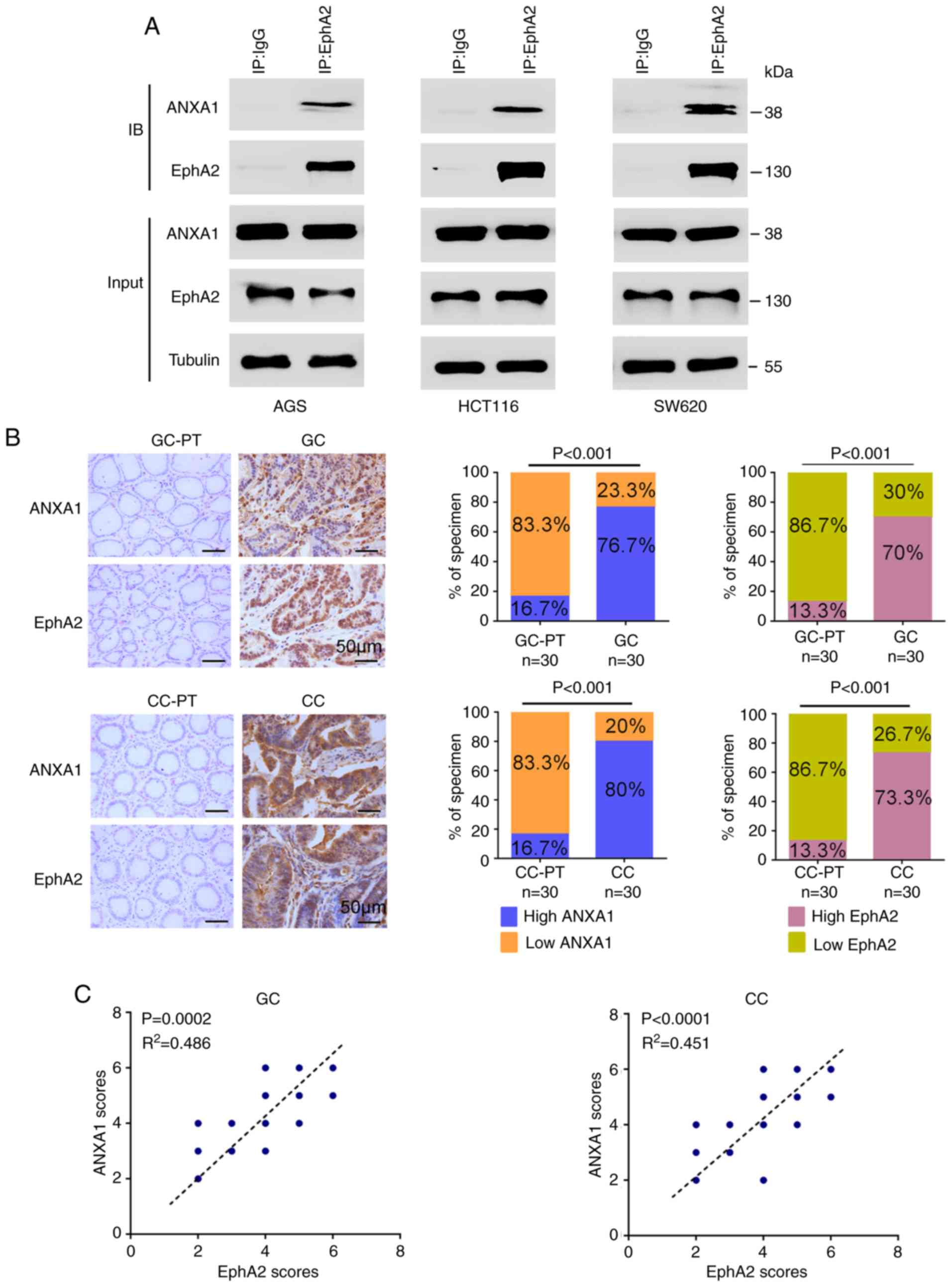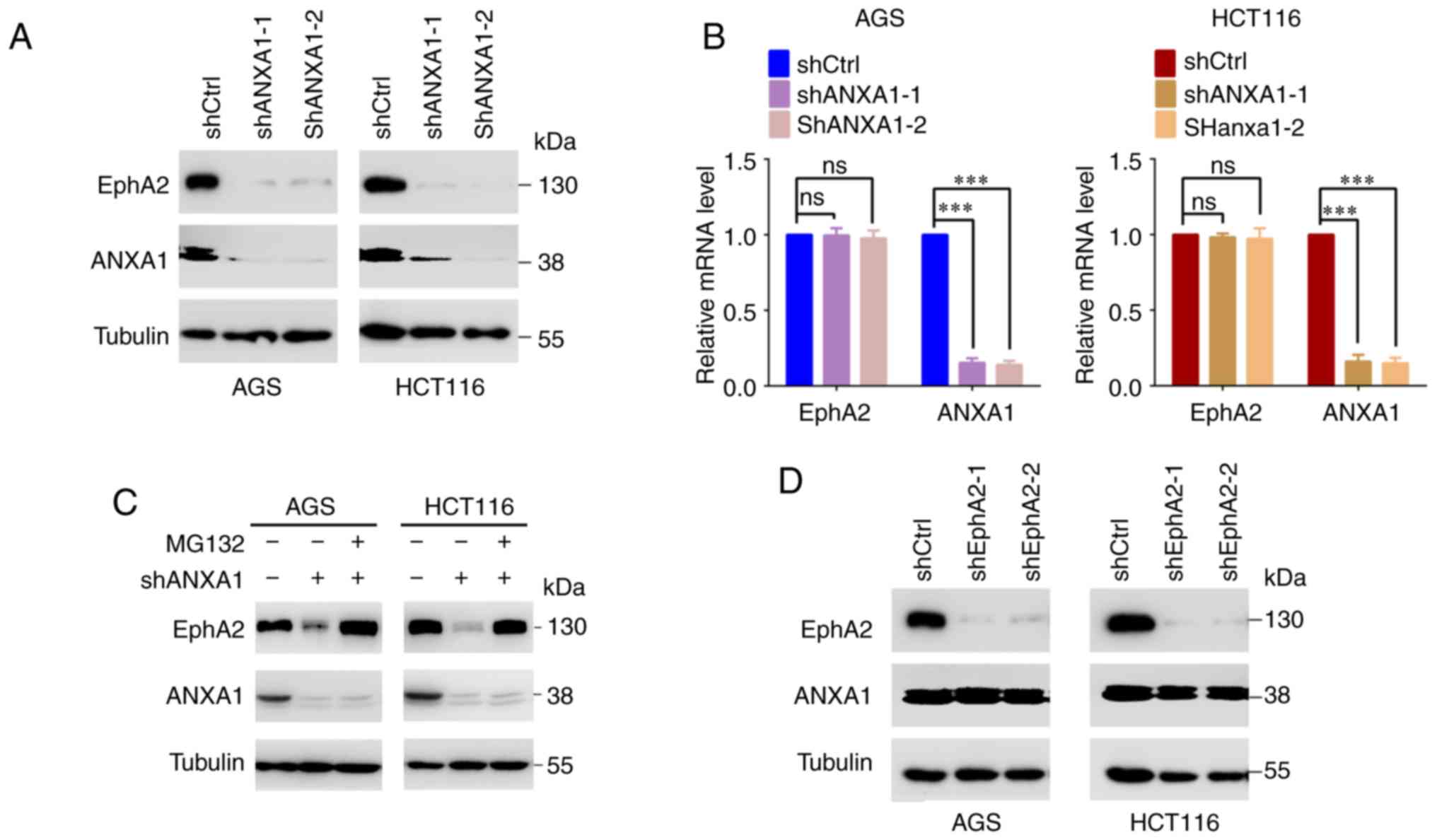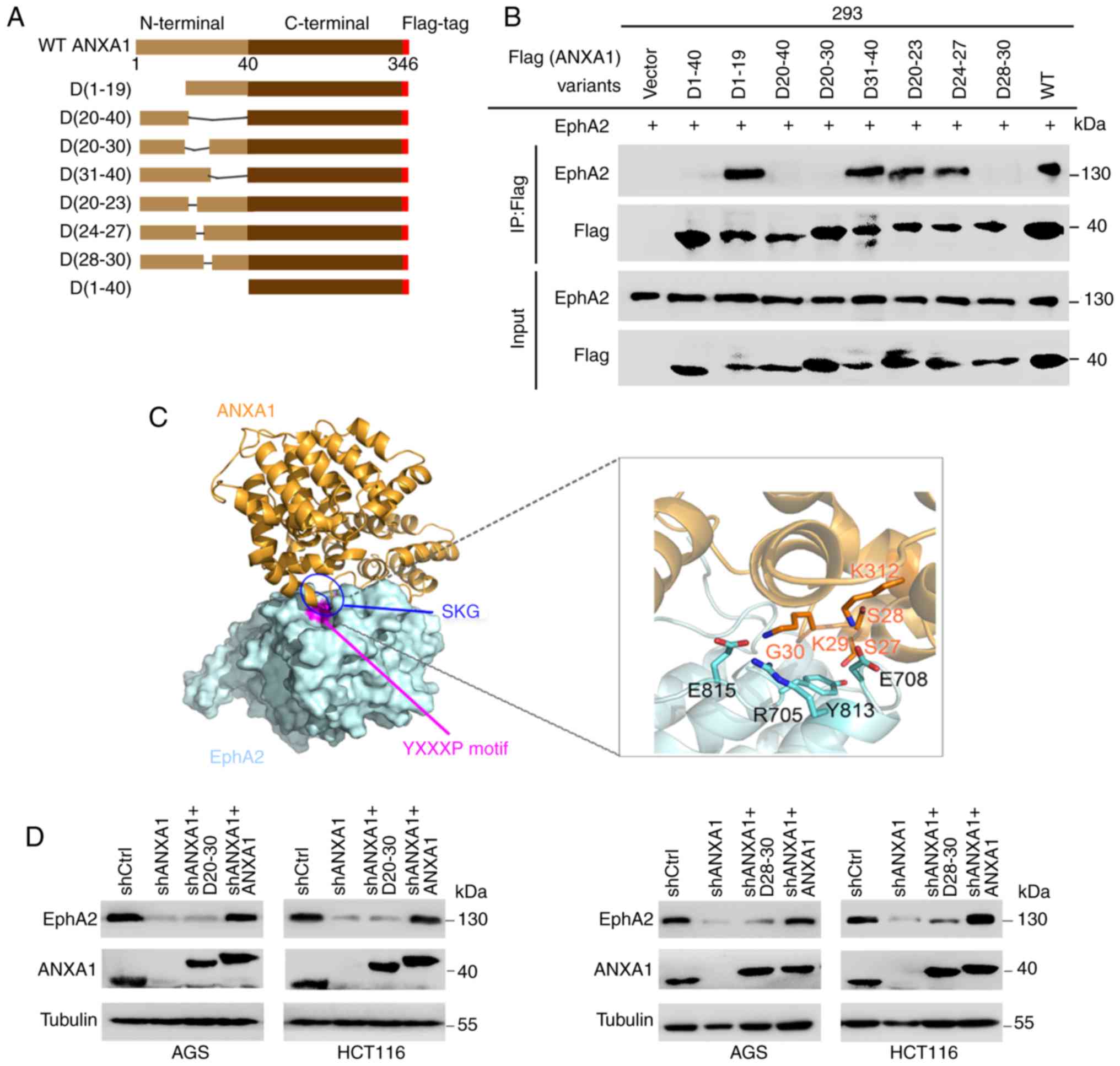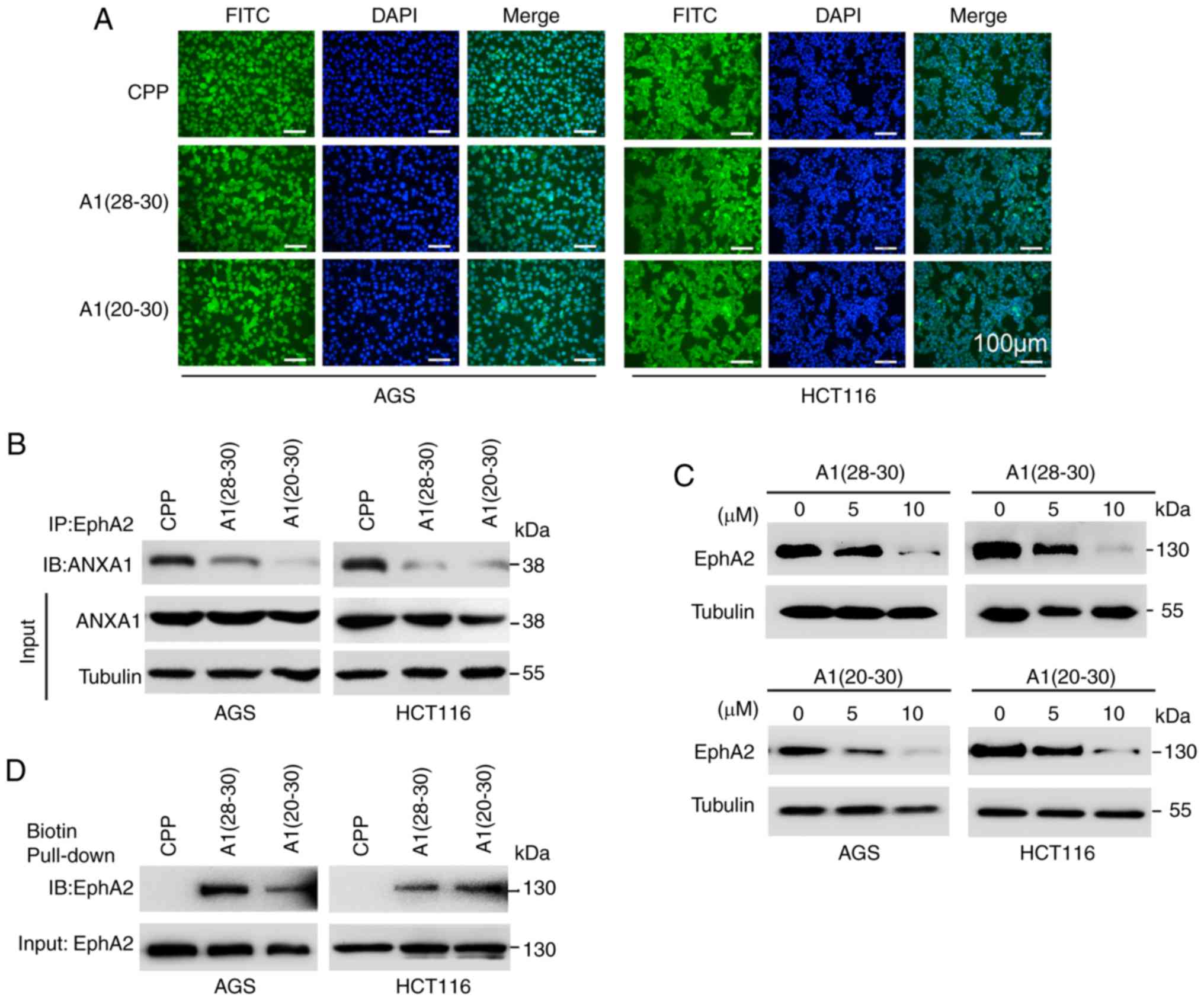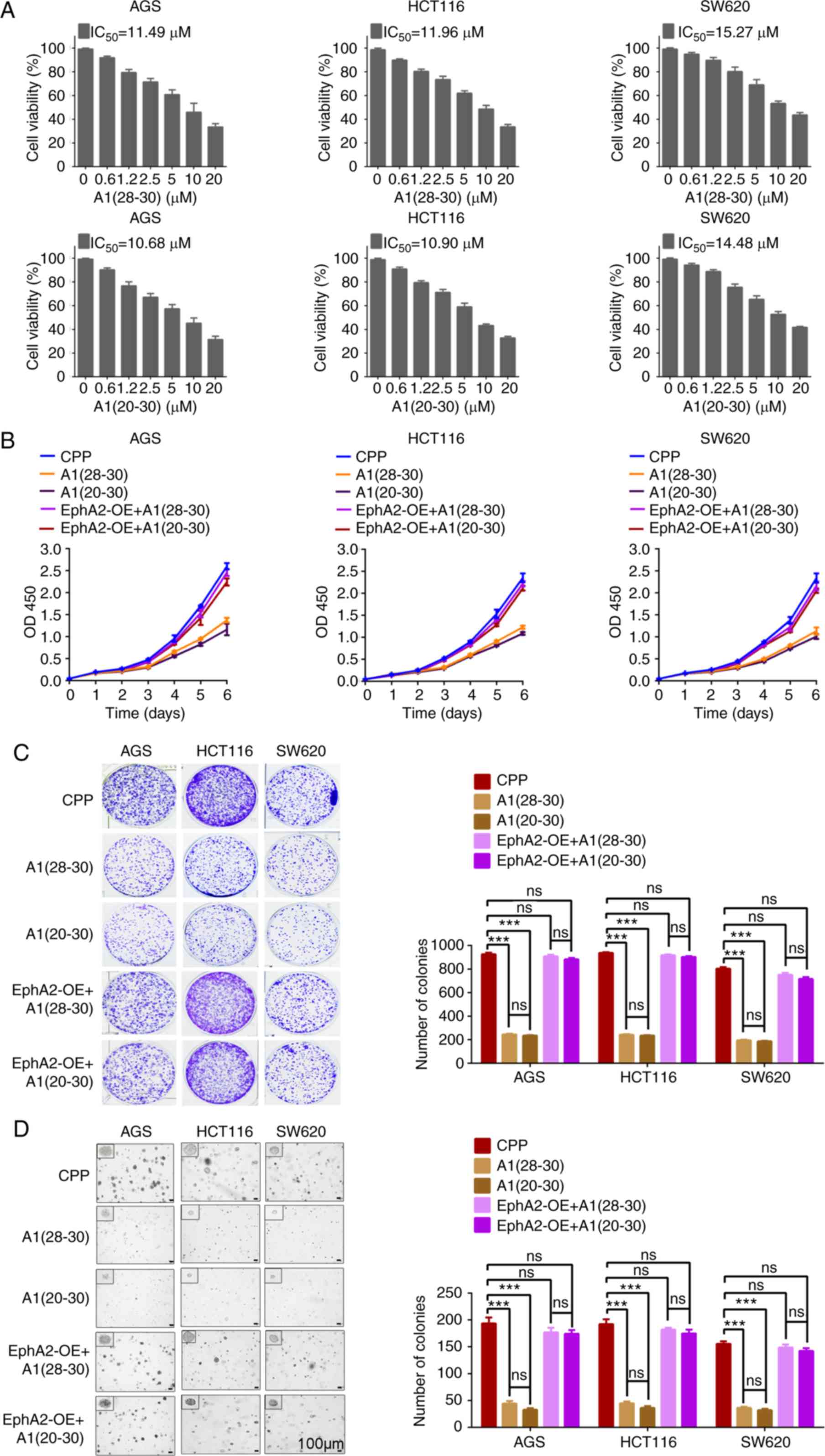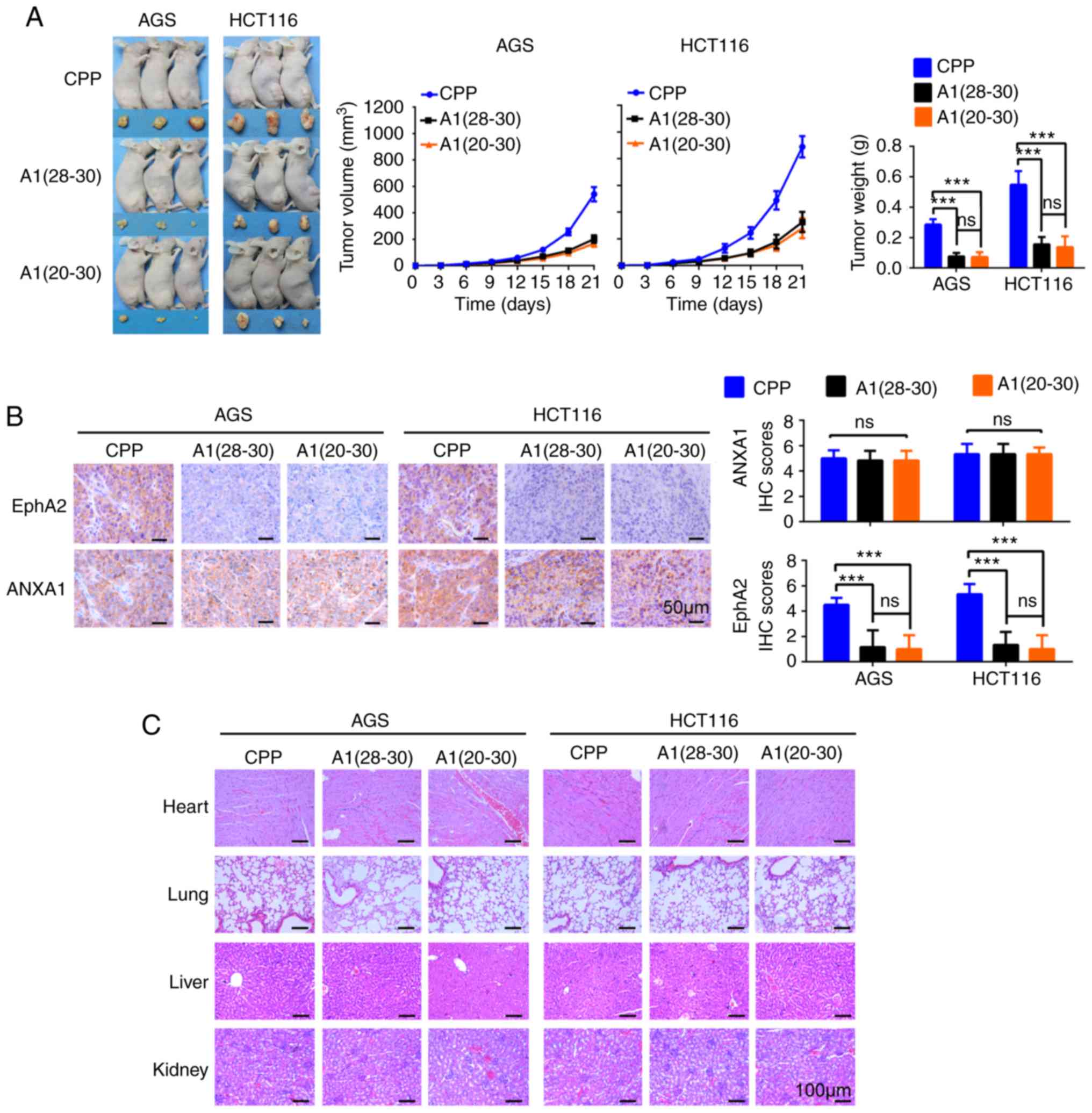|
1
|
Bray F, Ferlay J, Soerjomataram I, Siegel
RL, Torre LA and Jemal A: Global cancer statistics 2018: GLOBOCAN
estimates of incidence and mortality worldwide for 36 cancers in
185 countries. CA Cancer J Clin. 68:394–424. 2018. View Article : Google Scholar : PubMed/NCBI
|
|
2
|
Kelley JR and Duggan JM: Gastric cancer
epidemiology and risk factors. J Clin Epidemiol. 56:1–9. 2003.
View Article : Google Scholar : PubMed/NCBI
|
|
3
|
Siegel R, Desantis C and Jemal A:
Colorectal cancer statistics, 2014. CA Cancer J Clin. 64:104–117.
2014. View Article : Google Scholar : PubMed/NCBI
|
|
4
|
Pasquale EB: Eph-ephrin bidirectional
signaling in physiology and disease. Cell. 133:38–52. 2008.
View Article : Google Scholar : PubMed/NCBI
|
|
5
|
Pasquale EB: Eph receptors and ephrins in
cancer: Bidirectional signalling and beyond. Nat Rev Cancer.
10:165–180. 2010. View Article : Google Scholar : PubMed/NCBI
|
|
6
|
Markosyan N, Li J, Sun YH, Richman LP, Lin
JH, Yan F, Quinones L, Sela Y, Yamazoe T, Gordon N, et al: Tumor
cell-intrinsic EPHA2 suppresses anti-tumor immunity by regulating
PTGS2 (COX-2). J Clin Invest. 129:3594–3609. 2019. View Article : Google Scholar : PubMed/NCBI
|
|
7
|
Zhou Y, Yamada N, Tanaka T, Hori T,
Yokoyama S, Hayakawa Y, Yano S, Fukuoka J, Koizumi K, Saiki I and
Sakurai H: Crucial roles of RSK in cell motility by catalysing
serine phosphorylation of EphA2. Nat Commun. 6:76792015. View Article : Google Scholar : PubMed/NCBI
|
|
8
|
Miao H, Gale NW, Guo H, Qian J, Petty A,
Kaspar J, Murphy AJ, Valenzuela DM, Yancopoulos G, Hambardzumyan D,
et al: EphA2 promotes infiltrative invasion of glioma stem cells in
vivo through cross-talk with Akt and regulates stem cell
properties. Oncogene. 34:558–567. 2015. View Article : Google Scholar
|
|
9
|
Song W, Ma Y, Wang J, Brantley-Sieders D
and Chen J: JNK signaling mediates EPHA2-dependent tumor cell
proliferation, motility, and cancer stem cell-like properties in
non-small cell lung cancer. Cancer Res. 74:2444–2454. 2014.
View Article : Google Scholar : PubMed/NCBI
|
|
10
|
Binda E, Visioli A, Giani F, Lamorte G,
Copetti M, Pitter KL, Huse JT, Cajola L, Zanetti N, DiMeco F, et
al: The EphA2 receptor drives self-renewal and tumorigenicity in
stem-like tumor-propagating cells from human glioblastomas. Cancer
Cell. 22:765–780. 2012. View Article : Google Scholar : PubMed/NCBI
|
|
11
|
Miao H, Li DQ, Mukherjee A, Guo H, Petty
A, Cutter J, Basilion JP, Sedor J, Wu J, Danielpour D, et al: EphA2
mediates ligand-dependent inhibition and ligand-independent
promotion of cell migration and invasion via a reciprocal
regulatory loop with Akt. Cancer Cell. 16:9–20. 2009. View Article : Google Scholar : PubMed/NCBI
|
|
12
|
Wykosky J and Debinski W: The EphA2
receptor and ephrinA1 ligand in solid tumors: Function and
therapeutic targeting. Mol Cancer Res. 6:1795–1806. 2008.
View Article : Google Scholar : PubMed/NCBI
|
|
13
|
Tandon M, Vemula SV and Mittal SK:
Emerging strategies for EphA2 receptor targeting for cancer
therapeutics. Expert Opin Ther Targets. 15:31–51. 2011. View Article : Google Scholar :
|
|
14
|
Rescher U and Gerke V: Annexins-unique
membrane binding proteins with diverse functions. J Cell Sci.
117:2631–2639. 2004. View Article : Google Scholar : PubMed/NCBI
|
|
15
|
Perretti M and D'Acquisto F: Annexin A1
and glucocorticoids as effectors of the resolution of inflammation.
Nat Rev Immunol. 9:62–70. 2009. View Article : Google Scholar
|
|
16
|
Senchenkova EY, Ansari J, Becker F, Vital
SA, Al-Yafeai Z, Sparkenbaugh EM, Pawlinski R, Stokes KY, Carroll
JL, Dragoi AM, et al: Novel role for the AnxA1-Fpr2/ALX signaling
axis as a key regulator of platelet function to promote resolution
of inflammation. Circulation. 140:319–335. 2019. View Article : Google Scholar : PubMed/NCBI
|
|
17
|
Guo C, Liu S and Sun MZ: Potential role of
Anxa1 in cancer. Future Oncol. 9:1773–1793. 2013. View Article : Google Scholar : PubMed/NCBI
|
|
18
|
Huang J, Xiao D, Li G, Ma J, Chen P, Yuan
W, Hou F, Ge J, Zhong M, Tang Y, et al: EphA2 promotes
epithelial-mesenchymal transition through the Wnt/β-catenin pathway
in gastric cancer cells. Oncogene. 33:2737–2747. 2014. View Article : Google Scholar
|
|
19
|
Huang C, Yuan W, Lai C, Zhong S, Yang C,
Wang R, Mao L and Chen Z and Chen Z: EphA2-to-YAP pathway drives
gastric cancer growth and therapy resistance. Int J Cancer.
146:1937–1949. 2020. View Article : Google Scholar
|
|
20
|
Kikuchi S, Kaibe N, Morimoto K, Fukui H,
Niwa H, Maeyama Y, Takemura M, Matsumoto M, Nakamori S, Miwa H, et
al: Overexpression of Ephrin A2 receptors in cancer stromal cells
is a prognostic factor for the relapse of gastric cancer. Gastric
Cancer. 18:485–494. 2015. View Article : Google Scholar
|
|
21
|
Takaoka RTC, Sertorio ND, Magalini LPJ,
Dos Santos LM, Souza HR, Iyomasalon MM, Possebon L, Costa SS and
Girol AP: Expression profiles of Annexin A1, formylated peptide
receptors and cyclooxigenase-2 in gastroesophageal inflammations
and neoplasias. Pathol Res Pract. 214:181–186. 2018. View Article : Google Scholar
|
|
22
|
Wang X, Zhi Q, Liu S, Xue SL, Shen C, Li
Y, Wu C, Tang Z, Chen W, Song JL, et al: Identification of specific
biomarkers for gastric adenocarcinoma by ITRAQ proteomic approach.
Sci Rep. 6:388712016. View Article : Google Scholar : PubMed/NCBI
|
|
23
|
Zhang ZQ, Li XJ, Liu GT, Xia Y, Zhang XY
and Wen H: Identification of Annexin A1 protein expression in human
gastric adenocarcinoma using proteomics and tissue microarray.
World J Gastroenterol. 19:7795–7803. 2013. View Article : Google Scholar : PubMed/NCBI
|
|
24
|
Cheng TY, Wu MS, Lin JT, Lin MT, Shun CT,
Huang HY, Hua KT and Kuo ML: Annexin A1 is associated with gastric
cancer survival and promotes gastric cancer cell invasiveness
through the formyl peptide receptor/extracellular signal-regulated
kinase/integrin beta-1-binding protein 1 pathway. Cancer.
118:5757–5767. 2012. View Article : Google Scholar : PubMed/NCBI
|
|
25
|
Dunne PD, Dasgupta S, Blayney JK, McArt
DG, Redmond KL, Weir JA, Bradley CA, Sasazuki T, Shirasawa S, Wang
T, et al: EphA2 expression is a key driver of migration and
invasion and a poor prognostic marker in colorectal cancer. Clin
Cancer Res. 22:230–242. 2016. View Article : Google Scholar
|
|
26
|
Saito T, Masuda N, Miyazaki T, Kanoh K,
Suzuki H, Shimura T, Asao T and Kuwano H: Expression of EphA2 and
E-cadherin in colorectal cancer: Correlation with cancer
metastasis. Oncol Rep. 11:605–611. 2004.PubMed/NCBI
|
|
27
|
Sato Y, Kumamoto K, Saito K, Okayama H,
Hayase S, Kofunato Y, Miyamoto K, Nakamura I, Ohki S, Koyama Y and
Takenoshita S: Up-regulated Annexin A1 expression in
gastro-intestinal cancer is associated with cancer invasion and
lymph node metastasis. Exp Ther Med. 2:239–243. 2011. View Article : Google Scholar : PubMed/NCBI
|
|
28
|
Onozawa H, Saito M, Saito K, Kanke Y,
Watanabe Y, Hayase S, Sakamoto W, Ishigame T, Momma T, Ohki S and
Takenoshita S: Annexin A1 is involved in resistance to 5-FU in
colon cancer cells. Oncol Rep. 37:235–240. 2017. View Article : Google Scholar
|
|
29
|
Ydy LR, do Espirito Santo GF, de Menezes
I, Martins MS, Ignotti E and Damazo AS: Study of the Annexin A1 and
its associations with carcinoembryonic antigen and mismatch repair
proteins in colorectal cancer. J Gastrointest Cancer. 47:61–68.
2016. View Article : Google Scholar
|
|
30
|
Radke S, Austermann J, Russo-Marie F,
Gerke V and Rescher U: Specific association of annexin 1 with
plasma membrane-resident and internalized EGF receptors mediated
through the protein core domain. FEBS Lett. 578:95–98. 2004.
View Article : Google Scholar : PubMed/NCBI
|
|
31
|
White IJ, Bailey LM, Aghakhani MR, Moss SE
and Futter CE: EGF stimulates annexin 1-dependent inward
vesiculation in a multivesicular endosome subpopulation. EMBO J.
25:1–12. 2006. View Article : Google Scholar
|
|
32
|
Poeter M, Radke S, Koese M, Hessner F,
Hegemann A, Musiol A, Gerke V, Grewal T and Rescher U: Disruption
of the annexin A1/S100A11 complex increases the migration and
clonogenic growth by dysregulating epithelial growth factor (EGF)
signaling. Biochim Biophys Acta. 1833:1700–1711. 2013. View Article : Google Scholar
|
|
33
|
Akram ON, DeGraff DJ, Sheehan JH, Tilley
WD, Matusik RJ, Ahn JM and Raj GV: Tailoring peptidomimetics for
targeting protein-protein interactions. Mol Cancer Res. 12:967–978.
2014. View Article : Google Scholar : PubMed/NCBI
|
|
34
|
Iyer VV: A review of stapled peptides and
small molecules to inhibit protein-protein interactions in cancer.
Curr Med Chem. 23:3025–3043. 2016. View Article : Google Scholar : PubMed/NCBI
|
|
35
|
Ferreira LG, Oliva G and Andricopulo AD:
Protein-protein interaction inhibitors: Advances in anticancer drug
design. Expert Opin Drug Discov. 11:957–968. 2016. View Article : Google Scholar : PubMed/NCBI
|
|
36
|
Jafary F, Ganjalikhany MR, Moradi A,
Hemati M and Jafari S: Novel peptide inhibitors for lactate
dehydrogenase A (LDHA): A survey to inhibit LDHA activity via
disruption of protein-protein interaction. Sci Rep. 9:46862019.
View Article : Google Scholar : PubMed/NCBI
|
|
37
|
Yeon M, Byun J, Kim H, Kim M, Jung HS,
Jeon D, Kim Y and Jeoung D: CAGE binds to beclin1, rregulates
autophagic flux and CAGE-derived peptide confers sensitivity to
anti-cancer drugs in non-small cell lung cancer cells. Front Oncol.
8:5992018. View Article : Google Scholar
|
|
38
|
Liang L, Wang H, Shi H, Li Z, Yao H, Bu Z,
Song N, Li C, Xiang D, Zhang Y, et al: A designed peptide targets
two types of modifications of p53 with anti-cancer activity. Cell
Chem Biol. 25:761–774 e765. 2018. View Article : Google Scholar : PubMed/NCBI
|
|
39
|
Henninot A, Collins JC and Nuss JM: The
current state of peptide drug discovery: Back to the future? J Med
Chem. 61:1382–1414. 2018. View Article : Google Scholar
|
|
40
|
Di L: Strategic approaches to optimizing
peptide ADME proper-ties. AAPS J. 17:134–143. 2015. View Article : Google Scholar
|
|
41
|
Li JY, Xiao T, Yi HM, Yi H, Feng J, Zhu
JF, Huang W, Lu SS, Zhou YH, Li XH and Xiao ZQ: S897
phosphorylation of EphA2 is indispensable for EphA2-dependent
nasopharyngeal carcinoma cell invasion, metastasis and stem
properties. Cancer Lett. 444:162–174. 2019. View Article : Google Scholar
|
|
42
|
Zhu JF, Huang W, Yi HM, Xiao T, Li JY,
Feng J, Yi H, Lu SS, Li XH, Lu RH, et al: Annexin A1-suppressed
autophagy promotes nasopharyngeal carcinoma cell invasion and
metastasis by PI3K/AKT signaling activation. Cell Death Dis.
9:11542018. View Article : Google Scholar : PubMed/NCBI
|
|
43
|
Mozayan A and Khaled A: Elucidation of
therapeutic peptide binding partners from isolated mitochondria.
Cureus. 10:e28982018.PubMed/NCBI
|
|
44
|
Yi HM, Yi H, Zhu JF, Xiao T, Lu SS, Guan
YJ and Xiao ZQ: A five-variable signature predicts radioresistance
and prognosis in nasopharyngeal carcinoma patients receiving
radical radio-therapy. Tumour Biol. 37:2941–2949. 2016. View Article : Google Scholar
|
|
45
|
Waterhouse A, Bertoni M, Bienert S, Studer
G, Tauriello G, Gumienny R, Heer FT, de Beer TAP, Rempfer C,
Bordoli L, et al: SWISS-MODEL: Homology modelling of protein
structures and complexes. Nucleic Acids Res. 46:W296–W303. 2018.
View Article : Google Scholar : PubMed/NCBI
|
|
46
|
Kozakov D, Hall DR, Xia B, Porter KA,
Padhorny D, Yueh C, Beglov D and Vajda S: The ClusPro web server
for protein-protein docking. Nat Protoc. 12:255–278. 2017.
View Article : Google Scholar : PubMed/NCBI
|
|
47
|
Sastry GM, Adzhigirey M, Day T,
Annabhimoju R and Sherman W: Protein and ligand preparation:
Parameters, proto-cols, and influence on virtual screening
enrichments. J Comput Aided Mol Des. 27:221–234. 2013. View Article : Google Scholar : PubMed/NCBI
|
|
48
|
Maier JA, Martinez C, Kasavajhala K,
Wickstrom L, Hauser KE and Simmerling C: ff14SB: Improving the
accuracy of protein side chain and backbone parameters from ff99SB.
J Chem Theory Comput. 11:3696–3713. 2015. View Article : Google Scholar : PubMed/NCBI
|
|
49
|
Tang CE, Guan YJ, Yi B, Li XH, Liang K,
Zou HY, Yi H, Li MY, Zhang PF, Li C, et al: Identification of the
amyloid β-protein precursor and cystatin C as novel epidermal
growth factor receptor regulated secretory proteins in
nasopharyngeal carci-noma by proteomics. J Proteome Res.
9:6101–6111. 2010. View Article : Google Scholar : PubMed/NCBI
|
|
50
|
Xiao T, Zhu W, Huang W, Lu SS, Li XH, Xiao
ZQ and Yi H: RACK1 promotes tumorigenicity of colon cancer by
inducing cell autophagy. Cell Death Dis. 9:11482018. View Article : Google Scholar : PubMed/NCBI
|
|
51
|
Michiue H, Sakurai Y, Kondo N, Kitamatsu
M, Bin F, Nakajima K, Hirota Y, Kawabata S, Nishiki T, Ohmori I, et
al: The acceleration of boron neutron capture therapy using
multi-linked mercaptoundecahydrododecaborate (BSH) fused
cell-penetrating peptide. Biomaterials. 35:3396–3405. 2014.
View Article : Google Scholar : PubMed/NCBI
|
|
52
|
Pelay-Gimeno M, Glas A, Koch O and
Grossmann TN: Structure-based design of inhibitors of
protein-protein interactions: Mimicking peptide binding epitopes.
Angew Chem Int Ed Engl. 54:8896–8927. 2015. View Article : Google Scholar : PubMed/NCBI
|
|
53
|
Qvit N, Rubin SJS, Urban TJ, Mochly-Rosen
D and Gross ER: Peptidomimetic therapeutics: Scientific approaches
and opportunities. Drug Discov Today. 22:454–462. 2017. View Article : Google Scholar
|
|
54
|
Sabet O, Stockert R, Xouri G, Brüggemann
Y, Stanoev A and Bastiaens PIH: Ubiquitination switches EphA2
vesicular traffic from a continuous safeguard to a finite
signalling mode. Nat Commun. 6:80472015. View Article : Google Scholar : PubMed/NCBI
|
|
55
|
Naudin C, Sirvent A, Leroy C, Larive R,
Simon V, Pannequin J, Bourgaux JF, Pierre J, Robert B, Hollande F
and Roche S: SLAP displays tumour suppressor functions in
colorectal cancer via destabilization of the SRC substrate EPHA2.
Nat Commun. 5:31592014. View Article : Google Scholar : PubMed/NCBI
|
|
56
|
Annamalai B, Liu X, Gopal U and Isaacs JS:
Hsp90 is an essential regulator of EphA2 receptor stability and
signaling: Implications for cancer cell migration and metastasis.
Mol Cancer Res. 7:1021–1032. 2009. View Article : Google Scholar : PubMed/NCBI
|















